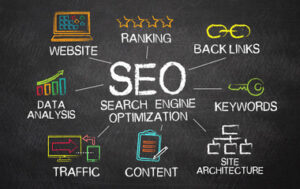Social media ads provide cost-effective and flexible advertising solutions for businesses of any size. With scalability and performance metrics, they’re ideal for budget planning and resource allocation.

Advanced targeting and personalization techniques drive campaigns that resonate with audiences. They also provide invaluable feedback loops, enabling continual improvement and higher ROI. Contact Rank Boss for professional help.
The sheer number of users on social media platforms makes them ideal places to reach a vast audience with targeted advertising messages. With social ad campaigns, marketers can increase brand awareness, promote products or services, drive website traffic, and generate leads or conversions.
Most social media platforms offer robust targeting capabilities based on demographics, interests, behaviors, and custom audiences. Demographic targeting helps marketers identify and reach specific target groups, resulting in higher engagement rates and ROI. Behavioral targeting allows advertisers to select from predefined targeting criteria or create custom audiences based on their own data, such as past purchases, online browsing behavior, or device usage.
Custom audiences allow marketers to reconnect with previous customers or users who expressed interest in the brand, boosting campaign effectiveness and conversion rates. Lookalike audiences, available on Facebook and Instagram, help expand reach by targeting similar users, ensuring ads remain relevant and increasing performance. Interest-based targeting helps marketers identify potential customers by analyzing their hobbies, passions, and activities, leading to more relevant ad delivery and better ad response.
Platform-specific ad formats, such as Instagram’s story ads and Facebook marketplace ads, also add to the versatility of social media advertising. These features enable businesses to engage their target audience with creative, impactful content that aligns with the platform’s unique strengths.
Consistently running well-crafted social media ads builds credibility and trust for brands, establishing them as leaders in their industries. This can lead to long-term brand loyalty and growth. Using effective ad copywriting techniques and engaging visuals helps advertisers develop attention-grabbing, compelling messaging that resonates with the audience.
Measuring campaign performance on a regular basis is essential to understanding what strategies are working and where improvements can be made. Monitoring key metrics, such as likes, shares, and clicks, provides crucial insights into how your audience is responding to your social media advertising efforts. Tools, such as Google Analytics and Facebook Insights, provide detailed performance breakdowns and allow you to track conversions (like sales or sign-ups) directly attributed to your social media ads. This enables you to track ROI and refine your marketing strategies to achieve your business objectives.
Scalability
Whether you’re a small startup or a large corporation, social media ads offer scalability to accommodate your business’s needs. These platforms provide flexibility in budget and audience size, allowing you to expand your campaigns as you gain comfort with advertising and see positive ROI. You can also adjust your ad spend and target audience in response to real-time performance data, ensuring optimal use of your marketing dollars.
With scalability, you can create highly personalized ads that resonate deeply with your target audience and build brand recognition and loyalty. By using dynamic content, you can reach your audience on a more personal level and break down barriers that might otherwise prevent them from connecting with your brand.
Ads can be run on any of the major social media platforms, including Facebook and Instagram. These tools allow you to deliver ads that blend seamlessly with organic content to create a non-disruptive user experience. You can also use creative formats such as images, videos, carousels, and stories to engage your audience. Additionally, social media ad platforms offer retargeting capabilities that allow you to display your ads to users who’ve already visited your website or engaged with a previous ad.
When creating an ad, it’s important to have clear goals in mind and a precise message that resonates with your audience. You can then build a campaign that’s tailored to your unique audience, resulting in higher engagement and conversion rates.
Social media ad platforms collect a massive amount of consumer data that allows you to pinpoint your target audience and tailor campaigns to their specific interests. This data includes demographics, interests, locations, and more. You can also use data from your website, including pixel information (a snippet of code you install on your site) to track and monitor traffic. This allows you to retarget users who’ve visited your site but haven’t completed the desired action, such as purchasing a product or signing up for a newsletter.
By tracking metrics such as return on ad spend, cost per click, and engagement rate, you can fine-tune your ad strategy and maximize your social media ad scalability. Testing different ad creatives, targeting options, and messaging can help you identify the best mix to drive results and stretch your ad budget further.
Engagement Metrics
In the digital world, metrics are your compass, map, and secret weapon all rolled into one. They’re the vital signs that reveal how your audience interacts with your content, allowing you to build loyal and connected followers that support your brand long-term.
Customer engagement is at the heart of any marketing strategy, but the numbers that matter can seem a bit intimidating. To make sense of your data, it’s important to know which metrics are relevant for each campaign, and how each one relates to your overall business objectives.
Basic engagement metrics include likes, shares, video views and saves, clicks, and story completion rates. Likes provide a quick view of initial interest, but share and saves are more telling, as they require the user to take active action. Moreover, these metrics allow you to track how your content resonates with your audience, helping you identify the types of content that are most effective for your specific audience.
Similarly, impressions and reach are essential social media marketing KPIs that allow you to gauge the visibility and potential audience size of your content. While reach is about visibility, engagement reflects the actual activity and interest of your audience. To optimize your campaigns, it’s best to balance both reach and engagement metrics. If your goal is to increase awareness, reach may be more important than engagement; if you’re focused on building community or conversions, however, engagement will be more valuable.
Other key metrics to keep an eye on include average order value (AOV), return on advertising spend (ROAS), and customer lifetime value (CLTV). AOV provides a snapshot of the amount of money your customers are expected to generate for your business over their entire engagement cycle, including future purchases, upsells, and cross-sells. ROAS enables you to measure the profitability of your social media campaigns and set appropriate budgets.
Finally, customer retention metrics such as customer satisfaction (CSAT) and average response time help you determine how satisfied your audience is with your brand, and how quickly you are able to respond to their questions and concerns.
Real-Time Analytics
Real-time analytics let you track performance metrics on the fly, making it easy to tweak campaigns as needed. By reducing the delay between data generation and analysis, you can make immediate improvements to campaign content, targeting, or budgets. This flexibility improves overall campaign performance and delivers a more seamless customer experience.
For example, if you run a Facebook ad that is performing well but is not driving traffic to your website, you can use real-time social media analytics to see where the audience is coming from (e.g., search, referrals, email, or direct). Then you can adjust the ad creative and messaging to better meet customers’ needs.
You can also monitor how visitors from social media are interacting with your website using Google Analytics, including their behavior and conversions. To do this, select the “Source/Medium” report in the Acquisition tab and then filter by Social, to isolate traffic from your social media ads. Then, you can analyze user behavior like page visits, goal completions (sign-ups or add to cart events) and other conversion metrics in real time to make informed decisions and deliver personalized messaging.
In addition to monitoring your own social media performance, you can use industry benchmarking tools to compare your marketing strategy with those of your competitors. This lets you identify opportunities for improvement and set goals that are realistic and achievable.
The best social media analytics tools give you the information you need to develop a more effective multi-channel marketing strategy. In the future, as more platforms shift from long-form to short-form video content, your ability to create and deliver high-performing videos will be key to success.
In the meantime, a social media analytics tool that can provide instant analysis of your content and ads is essential for driving successful results. Learn how the AgencyAnalytics platform can help you centralize your reporting and provide AI-driven insights that drive better results for your clients. Click the button below to download our free eBook to discover how you can improve your marketing efforts with the right social media analytics tool.
